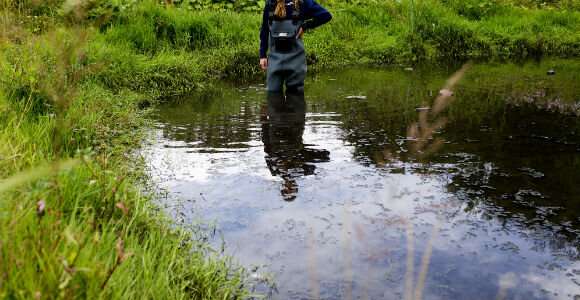Phosphate pollutes Nature's waterways. Credit: Lene Esthave.
Phosphorus is an essential resource for the world's food production. Yet, no international institutions govern the Earth's limited resources. An international team of 40 phosphorus experts now express their concern and make a call to action.
Phosphorus in the form of phosphate is essential for the existence of all plants, animals and humans. On one hand, the world needs phosphate as fertilizer for agricultural food production. On the other hand, we waste so much of it that it pollutes our water resources on a global scale. Large amounts of phosphate end up in nature's waterways and must be removed from wastewater.
We need phosphorus to grow food
This has to change. There are only a few phosphorus mines in the world, and if we do not find a way to recycle our very limited phosphate resources, the world will eventually run out, and that will be a disaster: Without phosphate, the worlds' farmers will not be able to produce enough food for our growing human population, says Kasper Reitzel, a phosphorus expert and associate professor at University of Southern Denmark. He is one of 40 international phosphorus experts stating that there is a pressing need to approach the phosphorus crisis.
Their concern and call to action is published in the scientific journal Environmental Science and Technology.
Industries and universities together
The 40 experts are from industries, universities and research institutes in 12 different countries, among them four are from University of Southern Denmark (biologist, associated professor Kasper Reitzel, biologist, associated professor Sara Egemose, chemist, associated professor Ulla Gro Nielsen and chemical engineer, professor mso, Haiyan Qu).
Not only are we overexploiting the world's phosphorus resources, but we also waste a lot of it. Large amounts are washed off farmers' fields and into streams, lakes and other water resources, causing water pollution.
According to the expert group, no international bodies govern global phosphorus resources. Resources are managed by local or national authorities and often, regulations and technologies are not up-to-date.
The system needs change
"There is no collaboration or coordination on a global scale that takes the responsibility of governing the global P-resource, not even between EU member states or the states of USA. The EU Water Framework Directives or the American Clean Water Act focus predominantly on the ecological quality of water, and do not integrate P sustainability to a sufficient level," says Kasper Reitzel.
The experts recommend the development of a new generation of nutrient sustainability professionals. They must work collectively and interdisciplinarily to secure international phosphorus management and a clean environment.
"These people should not be simple phosphorus specialists, but rather "system thinkers" who can inform judicious decision making on all aspects of the management of phosphorus," says Reitzel.
More information: Kasper Reitzel et al, New Training to Meet the Global Phosphorus Challenge, Environmental Science & Technology (2019). DOI: 10.1021/acs.est.9b03519
Journal information: Environmental Science and Technology , Environmental Science & Technology
Provided by University of Southern Denmark























